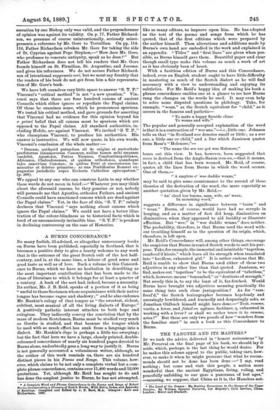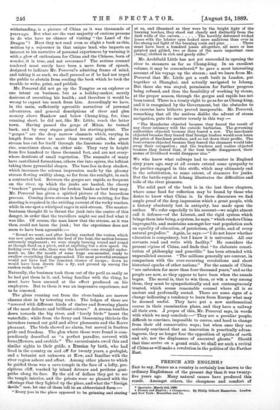THE YANGTZE AND ITS MASTERS.*
IF we took the advice, delivered in " honest seriousness " by Mr. Perceval on the final page of his book, we should lay it aside, which, perhaps, is the last thing he would desire. For he makes this solemn appeal to the public, taking care, how- ever, to make it when he might presume that what he recom- mends should not be done has been done :—" I say, read nothing ; but come and visit this people, a nation more wonderful than the ancient Egyptians, living, ruling, and peacefully unfolding to our gaze a panorama of lost ages," —meaning, we suppose, that China as it is, the Manchus not-
• The Land of the Dragon : My Boating Excursions to the Gorges of the Upper Yangtze. By William Spenoer Perceral, her Majesty's MIS Berries. China. London : Horst and Blackett.
withstanding, is a picture of China as it was thousands of years ago. But what are the vast majority of curious persons to do who have no chance of visiting " the Land of the Dragon "P Must they not read even so slight a book as this, written by a sojourner in that unique land, who imparts an interest to his narrative of personal experiences by warming it with a glow of enthusiasm for China and the Chinese, born of wonder, it is true, and not reverence P The serious counsel tendered must surely have been a mere form of speech, designed to indicate Mr. Perceval's admiring frame of mind, and taking it as such, we shall proceed as if he had not urged the public to abstain from reading the book which he took the trouble to write, print, and publish.
Mr. Perceval did not go up the Yangtze as an explorer or one intent on business, but as a holiday-maker, merely desirous of recruiting his health ; and therefore it would be wrong to expect too much from him. Accordingly we have, in the main, sufficiently agreeable narratives of personal
adventures, and general descriptions of river and glen
scenery above Hankow and below Chung-king, for, time running short, he did not, like Mr. Little, reach the latter town. Having passed the gorge of Mitan, he turned back, and by easy stages gained his starting-point. The " gorges " are the deep narrow channels which, varying in length from three to more than twenty miles, the great stream has cut for itself through the limestone rocks, which rise, sometimes sheer, on either side. They vary in height from five hundred to three thousand feet, and are not every- where destitute of small vegetation. The summits of many have castellated formations, others rise into spires, the loftiest taking these pyramidal shapes. The base lies in deep shadow, which increases the solemn impression made by the gloomy stream flowing swiftly along, so far from the sunlight, in such
a contracted bed. Between the gorges are rapids, so frequent
on the river, up which the junks are hauled, the cheery " trackers " passing along the broken banks as best they may.
Mr. Perceval has given a spirited picture of the hazardous process. Coming down-stream is hardly less exciting, for fine steering is required in the swirling current of the rocky reaches, while in one spot a whirlpool rages in mid-stream. The master- boatman thought fit to thrust the junk into the centre of this danger, in order that the travellers might see and feel what it was like. Of course, the man knew that the stream, as it was then, could not harm the junk ; but the experience does not seem to have been agreeable :—
"Round we went, and after having reached the vortex, which was now quite underneath the keel of the boat, the motion became extremely unpleasant; we were simply turning round and round as though fixed on a pivot, and at anything but a slow speed. On looking over the side, there was the horrible cone straight under- neath us, like the mouth of some huge sea-monster, ready to swallow everything that approached. The most powerful swimmer would not have had the remotest chance of escape ; down he would have been drawn like a fly, and ground up among the sunken rocks below."
Naturally, the boatman took them out of the peril as easily as
he had put them in it, and, being familiar with the thing, he must have been amused at the effect produced on his employers. But to them it was an impressive experience, not to be renewed.
The glens running out from the river-banks are narrow chasms shut in by towering rocks. The ledges of these are "covered with different kinds of timber and flowering plants of the most delicate and brilliant colours." A stream tumbles down towards the big river, and "lovely birds" haunt the waterfalls ; while from the ferny and blossoming thickets the intruders turned out gold and silver pheasants and the Reeve pheasant. The birds showed no alarm, but moved in fearless pride and freedom. The glen where these were found is com- pendiously described as " a perfect paradise, covered with fernsAflowers, and orchids." The excursionists owed this and
similar sights to their guide, a Russian by birth, who had
lived in the country, on and off for twenty years, a geologist, and a botanist not unknown at Kew, and familiar with the river region ashore and afloat. Among other places to which he guided them was a cave-temple in the face of a lofty, pre- cipitous cliff, reached by inland detours and perilous goat- paths along its face. By the aid of dollars they got to see the temple interior, and the priests were so pleased with the offerings that they lighted up the place, and what the " foreign devils" saw, let one of them tell in an abbreviated form :—
"Every joss in the place appeared to be grinning and staring
at us, and illumined as they were by the bright light of the burning torches, they stood out clearly and distinctly from the dark walls of the cavern The horribly deformed wicked josses with the lobster eyes looked more malicious than ever in the strong red light of the burning rosin and pine There .must have been a hundred josses altogether, all more or less painted and gilded, two or three of the more important ones [being] clothed in rich and gaudy silks."
Mr. Archibald Little has not yet succeeded in opening the river to steamers as far as Chung-king. In an excellent volume, it may be remembered,* he gave a, most interesting account of his voyage up the stream ; and we learn from Mr. Perceval that Mr. Little got a craft built in London, put together at Shanghai, and actually navigated to Ichang.
But there she was stayed, permission for further progress being refused, and thus the feasibility of working by steam, at the proper season, through the gorges and rapids has not been tested. There is a treaty-right to go as far as Chung-king, and it is recognised by the Government, but the obstacles to its exercise have hitherto proved insuperable. Mr. Perceval,
remarking that all the natives dislike the advent of steam navigation, puts the matter tersely in this way :-
" the Mandarins objected because they feared the result of any closer intimacy with the outside barbarian. The governing authorities objected because they feared a row. The merchants objected because they feared that foreign traders would soon learn the price of Szechuen produce, and so cut down their profits. The boat-owners objected because they feared the steamers would take away their occupation ; and the trackers and coolies objected because they feared that, if the boat traffic disappeared, their means of livelihood would disappear also."
We who know what railways had to encounter in England sixty years ago, may at all events extend some sympathy to the parties engaged in this strife, which may ultimately end in the substitution, to some extent, of steamers for junks. But the battle-royal at Ichang illustrates the difficulties and toils of the river pioneers.
The solid part of the book is in the last three chapters, where some food for reflection may be found by those who desire to know what China is. In these discourses we find ample proof of the deep impression which a great people, with a history absolutely lost in antiquity, has made upon the author. We refer especially to his account—we might almost call it defence—of the Literati, and the rigid system which brings them into being, a system, he says, " which renders China impregnable, and maintains amongst her vast population such an equality of education, of patriotism, of pride, and of every natural prejudice." Again, he says :—" I do not know whether education is compulsory, but I know it is universal. All our servants read and write with facility." He considers the present regime of China, and finds that "its elaborate consti- tution of philosophy and punctilio " has been attended with unparalleled success. " The millions generally are content, in comparison with the ever-recurring revolutions and short historical epochs of other nations." For the annals of China " are unbroken for more than four thousand years," and as the people are now, so they appear to have been when the annals
began. The moral is, that to win them, or win a way among them, they must be sympathetically and not contemptuously
treated, which seems reasonable counsel where all is so ancient and profoundly rooted. There are some signs of a change indicating a tendency to learn from Europe what may
be deemed useful. They have put a new mathematical
course in their examination plans, and they have a railway all their own. 1 propos of this, Mr. Perceval says, in words
with which we may conclude:--" They are a peculiar people; difficult to convince, impossible to coerce, and hard to change from their old conservative ways; but when once they are seriously convinced that an innovation it practically advan-
tageous, they no longer fear the opposition of spirits of earth and air, nor the displeasure of ancestral ghosts." Should that time arrive on a grand scale, we shall see such a revival of China as will make a revolution in the politics of the Farther East.



































 Previous page
Previous page